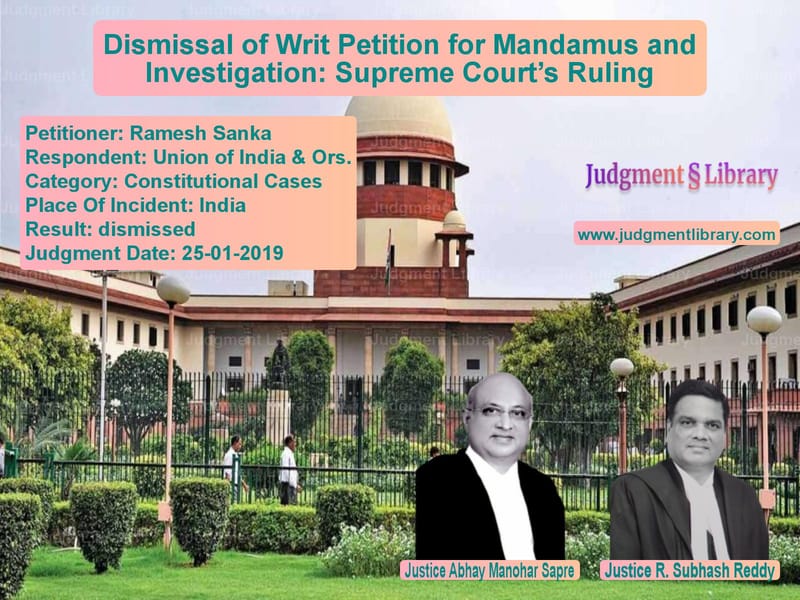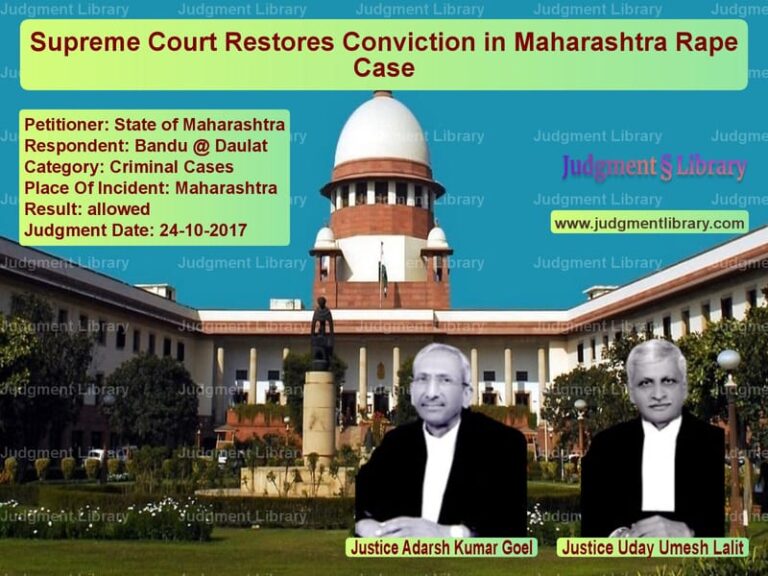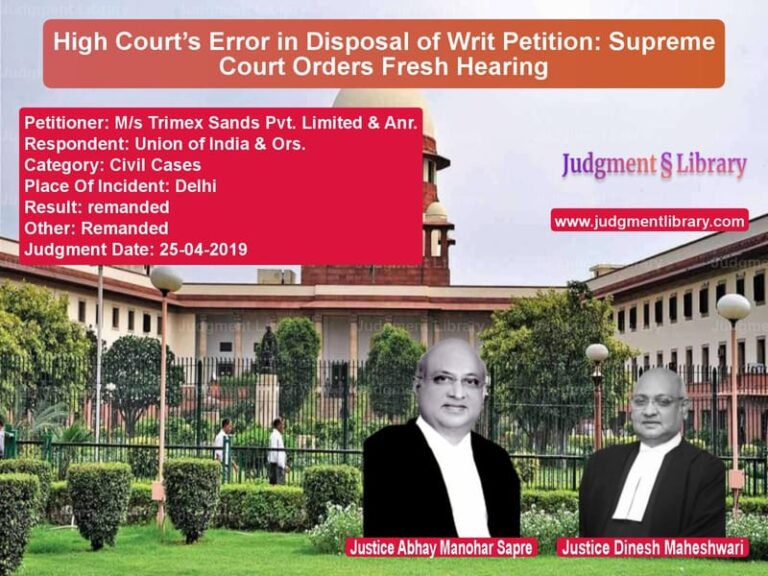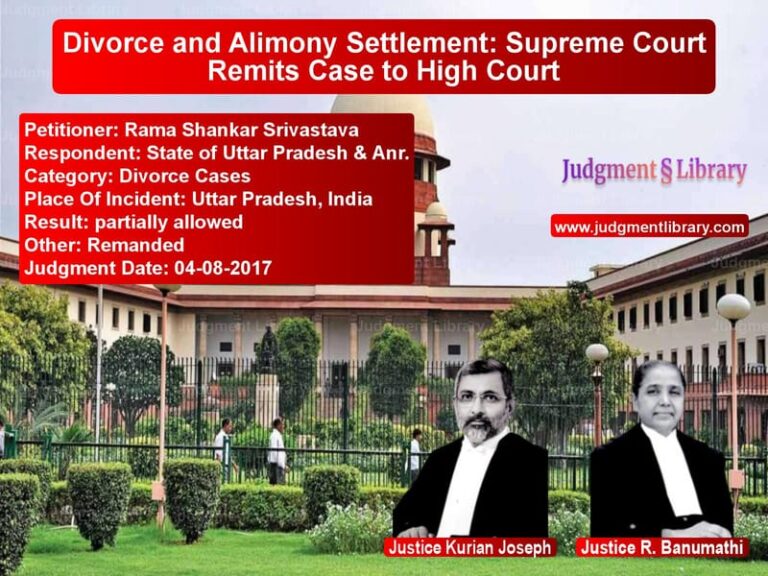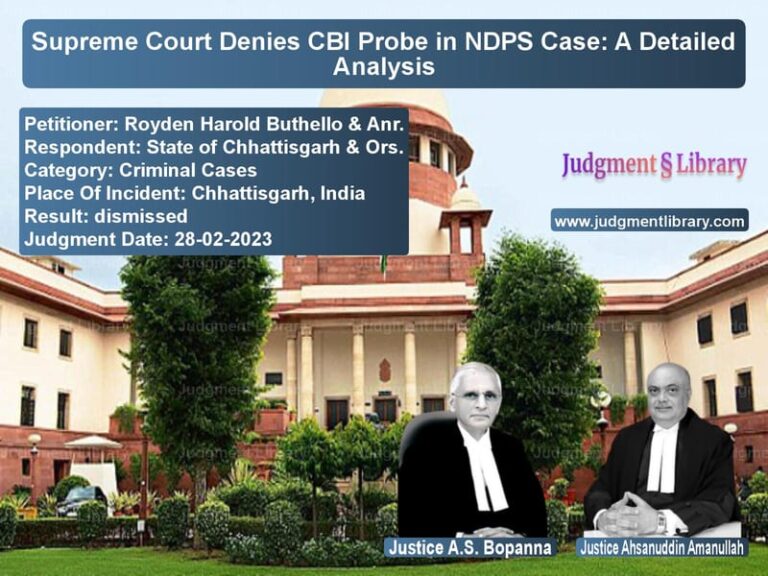Dismissal of Writ Petition for Mandamus and Investigation: Supreme Court’s Ruling
The case of Ramesh Sanka vs. Union of India & Ors. involves a writ petition filed under Article 32 of the Constitution of India, seeking the issuance of a writ of mandamus or directions to the Central Bureau of Investigation (CBI) to investigate the financial irregularities committed by the respondents, particularly Respondent No.12, a company with which the petitioner was formerly employed. The petitioner raised allegations against the company and its management regarding their business practices and financial dealings that allegedly contravened various legal provisions. The petitioner requested an investigation into these activities, claiming that they caused harm to the public exchequer and warranted legal action under criminal law. The matter was heard by the Supreme Court after multiple proceedings in the High Court and lower courts.
Background of the Case
The petitioner, Ramesh Sanka, was a former employee and CEO of Respondent No.12, a company with operations in India and abroad. The petitioner alleged that the company, through its directors and employees, engaged in financial irregularities and fraudulent activities that violated several Acts and regulations. Despite the petitioner submitting complaints and representations to various statutory authorities, no significant action was taken by the authorities. Consequently, the petitioner filed this writ petition under Article 32 of the Constitution, seeking a mandamus directing the CBI to investigate the matter.
In his petition, the petitioner highlighted specific instances of wrongdoing and fraudulent dealings conducted by Respondent No.12 and its associates. He also submitted evidence suggesting that the actions of these individuals and companies had caused significant financial loss and necessitated criminal prosecution. The petitioner argued that his rights were being violated due to the inaction of the authorities and requested the Supreme Court to intervene and direct the investigation of these serious allegations.
Petitioner’s Arguments
The petitioner argued that:
- The financial irregularities committed by Respondent No.12, including fraud and mismanagement of public funds, warranted a thorough investigation by the CBI.
- Despite submitting several complaints to the concerned authorities, the respondents had failed to take appropriate action, leading to further harm and potential loss to the public exchequer.
- The CBI’s intervention was necessary as the petitioner believed the matter fell within the scope of public interest and involved the violation of several laws.
- The respondents had failed to address the issues raised by the petitioner and had not been transparent in their business dealings.
Respondent’s Arguments
Respondent No.12, the company, argued that:
- The writ petition was filed for personal reasons, stemming from the petitioner’s grievances as a former employee.
- The petitioner’s allegations were baseless and lacked merit, with no substantial evidence to support the claims of financial irregularities or fraudulent activities.
- The writ petition was an attempt to tarnish the reputation of the company and its management, as the petitioner was involved in ongoing civil disputes with the company in relation to his employment.
- There were no violations of the petitioner’s fundamental rights, and the writ petition did not invoke any constitutional or legal grounds for intervention.
Supreme Court’s Observations and Ruling
The Supreme Court, after considering the submissions of both parties, made the following key observations and rulings:
1. The Purpose and Scope of Article 32
The Court began by examining the scope of a writ petition under Article 32 of the Constitution, noting that:
“Article 32 is a fundamental right that guarantees the right to approach the Supreme Court for enforcement of fundamental rights. However, the writ petition under Article 32 must be based on the violation of fundamental rights, and cannot be used to address personal grievances or disputes that are outside the purview of constitutional protection.”
The Court emphasized that the writ petition should focus on the violation of fundamental rights and that personal grievances regarding employment issues or contractual matters should be pursued through civil courts.
2. No Violation of Fundamental Rights
The Court found that the petitioner had failed to establish a clear violation of any fundamental rights guaranteed under the Constitution. The Court observed:
“The allegations raised by the petitioner, though serious, do not involve a violation of his fundamental rights. The matter concerns personal grievances and contractual rights that can be addressed in civil proceedings, not through a writ petition under Article 32.”
The Court concluded that the writ petition did not raise a constitutional issue that warranted judicial intervention under Article 32.
3. Pending Civil Proceedings
The Court noted that the petitioner was already pursuing his grievances in civil courts through pending lawsuits against the respondents. The Court stated:
“Since the petitioner is already prosecuting his grievances in civil courts, it would not be appropriate to entertain this writ petition. The petitioner must pursue his claims in the appropriate judicial forum, and this Court is not the proper forum for addressing such issues.”
The Court held that the petitioner should continue with the civil suits to resolve any personal disputes with the company, rather than seeking a writ under Article 32.
4. Public Interest and the Role of the CBI
The Court acknowledged the importance of investigating financial irregularities, but also pointed out that such investigations should be based on a clear legal framework and established procedure. The Court stated:
“The investigation of financial irregularities and potential fraud must be carried out by the appropriate authorities. The CBI can only intervene when a clear case of public interest or criminal violation is established. In this case, the petitioner has failed to demonstrate the necessity for such an intervention.”
The Court emphasized that the CBI’s role should be limited to cases where there was a clear violation of criminal law, and not be used to address personal grievances.
5. Conclusion of the Case
After considering the arguments and facts, the Supreme Court ruled:
“The writ petition is dismissed as it does not involve a violation of the petitioner’s fundamental rights. The petitioner is directed to pursue his grievances in the appropriate civil courts. No further relief is warranted in this matter.”
The Court concluded that the matter did not require the issuance of a writ under Article 32 and that the petitioner’s grievances must be addressed through the proper legal channels.
Conclusion
The Supreme Court’s judgment in this case reiterates the principle that writ petitions under Article 32 should be filed for the protection of fundamental rights and should not be used to resolve personal grievances or contractual disputes. The Court’s decision emphasizes that such matters should be dealt with in civil courts, and that judicial intervention through a writ petition should only occur when a clear constitutional violation is involved.
This case highlights the importance of approaching the appropriate forum for resolving legal disputes and reinforces the need for a clear legal basis when seeking judicial intervention.
Petitioner Name: Ramesh Sanka.Respondent Name: Union of India & Ors..Judgment By: Justice Abhay Manohar Sapre, Justice R. Subhash Reddy.Place Of Incident: India.Judgment Date: 25-01-2019.
Don’t miss out on the full details! Download the complete judgment in PDF format below and gain valuable insights instantly!
Download Judgment: Ramesh Sanka vs Union of India & Ors Supreme Court of India Judgment Dated 25-01-2019.pdf
Direct Downlaod Judgment: Direct downlaod this Judgment
See all petitions in Fundamental Rights
See all petitions in Public Interest Litigation
See all petitions in Judgment by Abhay Manohar Sapre
See all petitions in Judgment by R. Subhash Reddy
See all petitions in dismissed
See all petitions in supreme court of India judgments January 2019
See all petitions in 2019 judgments
See all posts in Constitutional Cases Category
See all allowed petitions in Constitutional Cases Category
See all Dismissed petitions in Constitutional Cases Category
See all partially allowed petitions in Constitutional Cases Category

